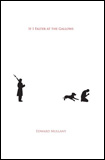Review by Michael Meyerhofer

Publishing Genius Press
2301 Avalon Avenue
Baltimore, MD 21217
ISBN: 978-0983170655
2011, 84 pp., $13.25
publishinggenius.com
As a poet, editor, and generally over-opinionated loudmouth, part of my soapbox issue is that many experimental poets seem to be experimental just for the sake of being unconventional and pseudo-provocative—in other words, their poetry is innovative but gutless. Not so with Mullany’s If I Falter at the Gallows. These poems are stylistically unique, mostly short (often just a few lines) with an obvious stream-of-consciousness vibe to them, but what really makes them leap off the page is their underlying tenderness, their unabashed examination of the human condition that reminds me of those famous Chinese poets, Li Po and Tu Fu. There are echoes of William Carlos Williams and James Wright here, too, especially in the following, short poem:
In Praise of Narrative Poetry
Into the bleak
lake on the estateon which no
one resides, fallsthe quiet
rain.
At the same time, these poems are distinctly postmodern, almost always favoring brief, lyrical snapshots over richly textured storytelling. For instance, consider the following, two-line poem in which the title (“The Horse that Drew the Cart that Carried the Condemned Man to the Gallows”) serves as a de facto opening line: “lived for a while longer/ and then died.”
The risk of such a poem is obvious; however, for me, the brevity serves to do an end-run around my natural contempt for blanket statements about mortality by focusing not on the condemned man (referenced only in the title), but the equally mortal beast-of-burden whose survival was simply a stay of execution. In that, it somewhat reminds me of “By Their Works,” a Bob Hicok poem in which Hicok tells the story of the Last Supper by focusing not on the central characters, but on the perspective of a waitress.
While a potential criticism of such short poems is that their ambition is overshadowed by gimmick, that would be missing an additional element that adds tension to Mullany’s work: the element of surprise. Often, that surprise resonates with social commentary that, exactly because of his poems’ blindsiding brevity, has an additional haunting quality. Consider the following five-line poem, New Light:
The sun is hardly
up overthe fields at the edge of the city
when the city
itself explodes.
Usually in poetry workshops, I find myself telling my students over and over again to be specific. What beer did you drink? What movie were you watching? What city were you in when a lover broke up with you over text message? In the case of this poem, though, the lack of background detail—especially when coupled with the points earned by the gentle pacing and pastoral beauty of the opening lines—frees my mind to imagine everything from literal atrocities (such as the atomic bombings of World War II) to more generalized, post-Cuban-Missile-Crisis, Hollywood-inspired fears engraved in our collective subconscious.
As I said, though, Mullany’s poems aren’t simply clever; while his poems are far from confessional, what really drives them is their underlying humanity. Take this short example, “No Children”:
When I come back
as a ghost, and try
to tell you all the things
for which I’m sorry,
you will hear nothing
but the sounds of the dryer,
which doesn’t mean
you’re not listening.
This playful but distinctly metaphysical poem reminds me of Hemingway’s oft-referenced Iceberg Theory in that its sparse details hint at a rich and tragic backstory, despite the fact that the poem also has echoes of dark humor that help carve it into the subconscious for further analysis.
Put another way, many of these poems remind me of Zen koans in that they short-circuit the brain in the best possible way. For instance, I feel like I get the following poem, even though I couldn’t explain it to you for a million bucks (except maybe to say that it has something to do with opposites and contrasts and the tension created between life and death):
The Entombment of Christ
Assume a black
dot on a whitewall and a white
dot on a blackwall are facing
each other.
Probably my favorite poem from this whole book, though, is “The Not So Simple Truth,” which manages to be unabashedly philosophical precisely because it draws its energy not from rote philosophical statements, but tactile, gentle imagery culminating in a musical, final turn:
Potatoes. Dirt and
water. And a softtowel left for us while
we shower. Thesethings are no
truer for theirplainness than peas
or pus or leprosy.
Despite the fact that virtually all the poems in this book are crafted with an extreme economy of language, the book itself still feels as broad in style as it does in subject matter. Again, these aren’t confessional poems, nor do they make much use of narrative, but their raw lyricism, twists, and humor speak to a deep intellect bolstered by innovation and, above all, a quiet sense of compassion.
Comments are closed.